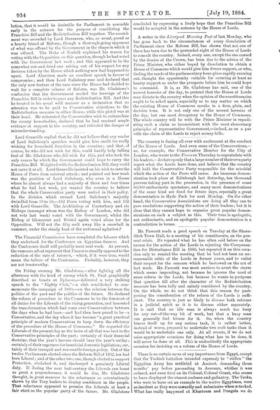On Friday evening Mr. Gladstone,—after fighting all the afternoon with
the kind of enemy which St. Paul graphically described as beasts at Ephesus,—delivered a very striking speech to the " Eighty Club,"— a club established to com- memorate the campaign of 1880,—on the relation between the politics of the past and the politics of the future. He declared the reform of procedure in the Commons to be the foremost of all duties for the Liberals of the rising generation, and lamented the transformation which had come over Conservatives between the days when he had been—and had then been proud to be—a Conservative, and the day when it has become "a great practical principle of modern Conservatives to keep down the efficiency of the procedure of the House of Commons." He regarded the Liberals of the present day as the heirs of all that was best in the Conservative principles of the past ; certainly of their financial doctrine, that the year's income should bear the year's outlay ; certainly of their eagerness for beneficial domestic legislation ; cer. tainly of their tranquil and reasonable foreign policy. Out of the twelve Parliaments elected since the Reform Bill of 1832, ten had been Liberal ; and of the other two, one, though elected to support Protection, abolished it, and discharged a genuinely Liberal duty. If during the next half-century the Liberals can boast as great a preponderance, it would be due, Mr. Gladstone thought, in great measure to the reluctance so ostentatiously shown by the Tory leaders to display confidence in the people. That reluctance appeared to promise the Liberals at least a fair start as the popular party of the future. Mr. Gladstone concluded by expressing a lively hope that the Franchise Bill would be accepted in the autumn by the House of Lords.


































 Previous page
Previous page